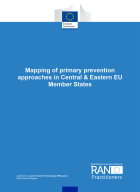Details
- Publication date
- 1 December 2023
- Author
- Directorate-General for Migration and Home Affairs
- RAN Publications Topic
- (Early) prevention
Description
Along with the increasing imbalance of the world political order, as a result of newly emerging conflicts, both military and commercial, epidemics and pandemics of new viruses, and economic crises, we can observe an intensification of the radicalisation process of their inhabitants in many parts of the world. One of the places in the EU where this process intensifies, especially in the case of violent right-wing extremists (VRWEs), is Central and Eastern Europe (CEE).
Here, this process is additionally combined with the relentlessly smouldering ethnic conflicts in the region, the fact that it borders on a country with an active armed conflict, the COVID-19 pandemic, the economic and resource crisis, and the actions of external actors. At the same time, these problems differ in many respects from those faced by western European countries. The problems related to VRWEs are much more intense in the CEE, and the problems related to violent left-wing extremism and violent Islamist extremists are much less intense. This is why it is essential to research and discuss local and regional preventing and countering violent extremism (P/CVE) good practices.
The aim of this paper is to take stock of existing approaches and practices developed and used by practitioners active in primary prevention, including social and family workers, teachers, mental health professionals, local authorities and law enforcement in the CEE Member States of the EU (Bulgaria, Czech Republic, Croatia, Lithuania, Hungary, Poland, Romania, Slovenia and Slovakia), and to present some of examples that may serve as useful inspirations on how to tackle primary prevention of radicalisation in the region.
This review includes projects and practices focusing on prevention of violent extremism and radicalisation specifically, but also efforts addressing related phenomena such as hate speech and hate crime, discrimination and xenophobia, polarisation, to the extent they are relevant for P/CVE work and needs of practitioners. Gender dimensions of P/CVE work as well as multi-agency cooperation in the respective practices/fields have also been considered and emphasised where relevant.
Based on an exploration of practical work and existing cases, this paper provides an overview of different promising practices, models and/or approaches in each country, as well as areas for future development of primary prevention for practitioners.

